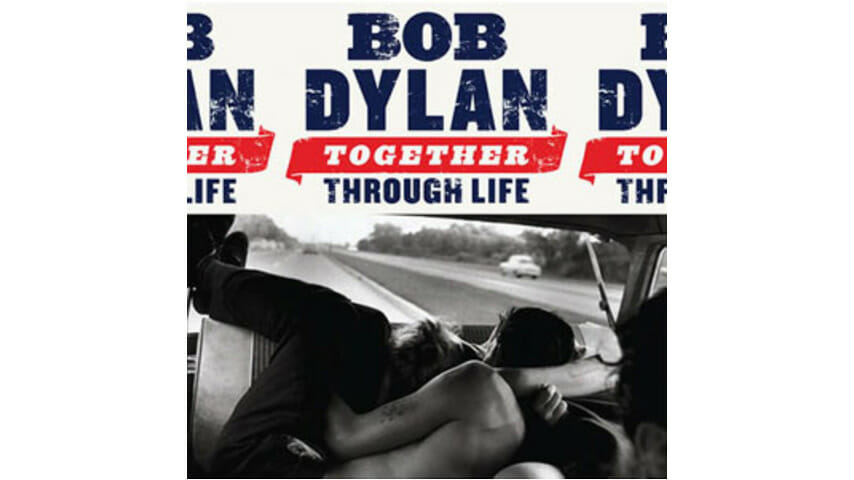Bob Dylan: Together Through Life

With Heartbreaker Mike Campbell and Los Lobos’ David Hidalgo in tow, Dylan’s 33rd studio release continues his never-ending end-times tour
Since Bob Dylan discovered, more than a decade ago, that musings on the passing of life and our inevitable collision with death best suited his ever-changing latter-day moods, he’s enjoyed one of the most productive—and critically hailed—periods of his artistically restless and seemingly endless career. Together Through Life finds Dylan less focused on greeting the Reaper than fighting him off a while longer; the better to savor the fruits, both bitter and sweet, that life has left to offer. The album—nine of its 10 songs co-written with Grateful Dead lyricist Robert Hunter, marking the first time Dylan has collaborated this heavily since working with Jacques Levy on 1976’s Desire—finds him plowing the same Americana furrow he’s been working for the past 12 years, but with a distinct border-town edge suited to the record’s reflective, riotous and emotionally rugged turns. The flare signal that something is different is first fired on opening gambit “Beyond Here Lies Nothin’,” in which Dylan’s touring band—supplemented by Los Lobos multi-instrumentalist David Hidalgo’s accordion and the stinging leads of Tom Petty guitarist Mike Campbell—lays down a ferociously swinging groove while Dylan implies that, aside from the love that exists here and now, there’s “nothin’ but the mountains of the past.”
Dylan’s never spent much time contemplating the rearview mirror, but Together Through Life finds him more resolutely focused on the treacherous horizon ever before: Song after song decries the mess we’re in (the sneering, sarcastic jump-blues “It’s All Good,” in which Dylan’s ravaged voice attacks the clichéd phrase as if it represented every banker, politician and Ponzi-scheme cheat he could conjure; “My Wife’s Home Town,” a bluesy jaunt that surveys the current economic wreckage as if from the passenger-side window of a car up on blocks) without forsaking the idea that love—and the comfort we find in shared misery—is essentially all we have left when a lifetime of ambition and achievement are swept away by the winds of change. You’d have to go all the way back to 1974’s Planet Waves—which Dylan summarized as “cast-iron songs & torch ballads”—to find a record on which he sounds so simultaneously anxious and enervated. Indeed, when Dylan croaks in “I Feel a Change Comin’ On,” “[I’ve] got the blood of the land in my voice,” you can hear quite plainly the sadness, disappointment and exhaustion of which he sings.
-

-

-

-

-

-

-

-

-

-

-

-

-

-

-

-

-

-

-

-

-

-

-

-

-

-

-

-

-

-

-

-

-

-

-

-

-

-

-

-








































